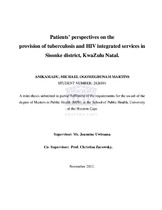| dc.description.abstract | Viewing the provision of TB-HIV integrated services from the perspectives of TB/HIV clients can help to identify ways to enhance the provision of these services. The aim of this study was to assess the provision of TB/HIV services including PMTCT from clients perspectives in order to make recommendations on ways to enhance the provision of TB/HIV/PMTCT services at facility and community level. Method: Secondary data analysis was undertaken on a survey that was part of a cross-sectional study conducted in 2008 in Sisonke district, a rural district of KwaZulu Natal province, South Africa. Exit interviews were completed by 274 clients accessing TB, HIV and PMTCT services in 10 selected facilities in Sisonke district. A questionnaire that had both closed and open-ended questions was used for exit interviews. Ethical clearance of the study was originally obtained from the Ethics Committee of the University of the Western Cape. The researcher sought permission from the custodian/owner (primary researcher) of the data. The researcher also adhered to maintaining data integrity including the confidentiality procedures as defined in the primary study. In analysing the data it was checked completeness and internal consistency. The quantitative part of the data was stratified, cleaned and coded. The qualitative part of the data was reviewed repeatedly and clustered. The measures of central tendency like frequency, means, median and standard deviation were used for continuous data while categorical data were analysed with frequency and proportions. The Chi-square test was used to assess the association between depend and independent variables. Results: The results of this study show that the respondents preferred accessing integrated TB-HIV/PMTCT services. Most of the respondents, especially a majority of younger respondents comprising of PMTCT (66.7%), HIV (29.8%) and TB (30.8%) categories reported that they were educated on HIV matters. Also, most of the younger respondents (18 – 30 years) among the PMTCT category (74.3%) and most of the older respondents (older than 30 years) of the pre ART & ART category (71.2%)reported that they were educated about TB matters.In general, the majority ( 90 %) of the respondents preferred TB/HIV/PMTCT services to be provided at the same place but a small majority (42%) of the respondents preferred to be seen the same clinicians. Most (68%) of the PMTCT younger (18-30 years) respondents preferred to receive TB-HIV integrated care at their homes while 70% and 68% of HIV and TB older respondents (>30 years) preferred to receive TB and HIV services at their homes. Viewing the advantages,disadvantages and barriers for accessing TB/HIV/PMTCT integrated services, there is a proportionate distribution in the responses amid the categories though the female respondents comparatively take the lead in reporting about their experiences in accessing TB/HIV/PMTCT integrated services. In this study, majority of the respondents demonstrated that they access good integrated TB-HIV/PMTCT services both at the facilities level and at home. Providing integrated TB-HIV/PMTCT services is widely accepted. Majority of the respondents especially the younger females preferred to continue receiving TB-HIV integrated care at their homes in comparison with older respondents. Conclusion: Most of the respondents comprised of females aged less than 30 years. These respondents like the services provided by the TB-HIV integrated services and want it sustained. They prefer the facilities to be in the same location. However, they prefer to consult different clinicians for the two different health conditions. The respondents also preferred to have HIV test at the same facility and to be visited at home by community health workers in support of the provision of TB/HIV/PMTCT care. | en_US |

